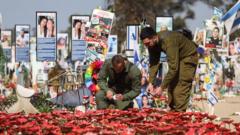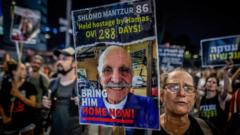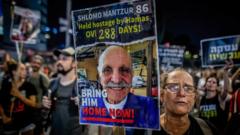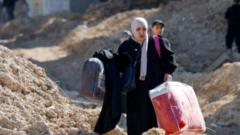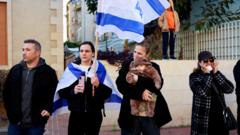In a shocking turn of events, the Israeli military has declared that the body purportedly returned by Hamas does not belong to Shiri Bibas as claimed, casting new uncertainty over the ceasefire efforts aimed at rescuing hostages.
Mix-Up of Bodies Creates Tension in Fragile Israel-Hamas Ceasefire Negotiations

Mix-Up of Bodies Creates Tension in Fragile Israel-Hamas Ceasefire Negotiations
The Israeli government announces a body returned from Gaza is not that of Shiri Bibas, deepening tensions amid ongoing ceasefire negotiations.
The article text:
The fragile ceasefire between Israel and Hamas faces renewed strain with the Israeli government reporting that a body returned from Gaza is not that of Shiri Bibas, as Hamas had claimed. This mix-up has emerged amidst ongoing efforts to negotiate the release of hostages taken during recent violent clashes.
Shiri Bibas, alongside her children Ariel and Kfir, was thought to be included in the exchange, but the Israeli military confirmed that forensic tests could only verify the identities of the two children, aged five and two. Israeli Prime Minister Benjamin Netanyahu accused Hamas of intermingling the remains with those of a Gazan woman, asserting that the ceasefire was marred by this "cruel and evil violation" of the agreement.
Hamas spokesperson, Ismail al-Thawabta, responded by suggesting that the mix-up is a result of the chaotic aftermath left by an Israeli airstrike, confirming that an investigation is underway. The group claims their commitment to the ceasefire remains steadfast, noting that they have "no interest in non-compliance."
The Bibas family, who were among the 251 individuals taken hostage during Hamas's coordination attacks on October 7, are now faced with further uncertainty. Shiri’s husband, Yarden, who was released prior, is left grappling with news that the remains of his wife may not be among those returned.
In retaliation for the mixing up of the bodies, Prime Minister Netanyahu emphasized the consequences Hamas will face, declaring they must pay for their actions. The continued assertion from Israel about the alleged killings of Ariel and Kfir during their captivity serves to heighten tensions, with military representatives declaring that these acts were executed "in cold blood."
Public sentiment in Israel appears overwhelmingly in favor of prioritizing the safe return of all hostages, which sets a difficult stage for forthcoming negotiations. President Isaac Herzog affirmed this perspective, insisting on a collective responsibility to bring home every Israeli captive.
As this situation unfolds, deeper challenges loom over the potential second phase of the ceasefire negotiations, which involves the release of all remaining hostages, amidst disagreements over disarmament and security in the region. With the potential for renewed hostilities, every development will be closely scrutinized as both sides navigate this perilous path toward a resolution.
The fragile ceasefire between Israel and Hamas faces renewed strain with the Israeli government reporting that a body returned from Gaza is not that of Shiri Bibas, as Hamas had claimed. This mix-up has emerged amidst ongoing efforts to negotiate the release of hostages taken during recent violent clashes.
Shiri Bibas, alongside her children Ariel and Kfir, was thought to be included in the exchange, but the Israeli military confirmed that forensic tests could only verify the identities of the two children, aged five and two. Israeli Prime Minister Benjamin Netanyahu accused Hamas of intermingling the remains with those of a Gazan woman, asserting that the ceasefire was marred by this "cruel and evil violation" of the agreement.
Hamas spokesperson, Ismail al-Thawabta, responded by suggesting that the mix-up is a result of the chaotic aftermath left by an Israeli airstrike, confirming that an investigation is underway. The group claims their commitment to the ceasefire remains steadfast, noting that they have "no interest in non-compliance."
The Bibas family, who were among the 251 individuals taken hostage during Hamas's coordination attacks on October 7, are now faced with further uncertainty. Shiri’s husband, Yarden, who was released prior, is left grappling with news that the remains of his wife may not be among those returned.
In retaliation for the mixing up of the bodies, Prime Minister Netanyahu emphasized the consequences Hamas will face, declaring they must pay for their actions. The continued assertion from Israel about the alleged killings of Ariel and Kfir during their captivity serves to heighten tensions, with military representatives declaring that these acts were executed "in cold blood."
Public sentiment in Israel appears overwhelmingly in favor of prioritizing the safe return of all hostages, which sets a difficult stage for forthcoming negotiations. President Isaac Herzog affirmed this perspective, insisting on a collective responsibility to bring home every Israeli captive.
As this situation unfolds, deeper challenges loom over the potential second phase of the ceasefire negotiations, which involves the release of all remaining hostages, amidst disagreements over disarmament and security in the region. With the potential for renewed hostilities, every development will be closely scrutinized as both sides navigate this perilous path toward a resolution.




